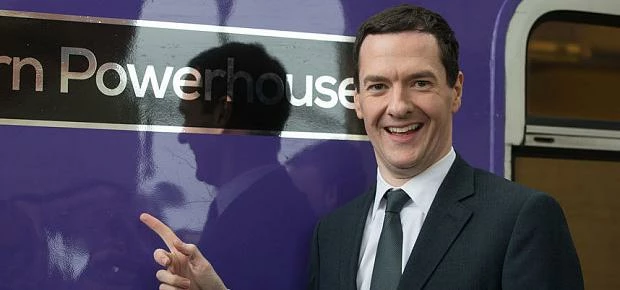
Partner Article
Could ROSCOs help save the Northern Powerhouse?
When George Osborne stands up this afternoon (8 July) to make his first Budget speech of this new government, many in the North will be hoping for some positive infrastructure announcements – particularly on rail transport – but they’re likely to be disappointed.
With concerns in the DfT and Treasury about escalating costs from Network Rail, the much-vaunted TransPennine electrification (which is key to the new TransPennine operator franchise) and the Midland Mainline improvements from Sheffield have both hit the buffers.
From a PR perspective, it’s not been great. The optimism that greeted the original investment announcements has certainly dissipated in the past week or so. Across the North, we’re back to negative headlines about the rail industry.
The Chancellor has reaffirmed his commitment to the Northern Powerhouse, but with those two key projects on hold and both HS2 and HS3 facing opposition within Parliament and beyond, the idea that better connectivity will help drive economic growth across the North is looking more and more like a pipedream.
Unless…
If the Government is saying Network Rail’s latest budget forecasts make those projects unaffordable, either we abandon any thought of significantly improving our rail network or we find the money elsewhere.
PFIs (Private Finance Initiatives) have had a kicking over the past 10 to 15 years, largely because they’re seen as being great news for the profit-making private sector but bad news for the poor old taxpayer, who ultimately foots the bill.
George Osborne may not be a fan of the PFI model, but that doesn’t mean he’s averse to private sector investment in public sector projects. In infrastructure, for example, he’s been keen to get pension funds to invest their considerable wealth. The fund managers, not wholly surprisingly, aren’t too keen on putting billions into what they perceive as high-risk investments.
The Pensions Infrastructure Platform was targeted with raising £2bn from pension funds in its first 12 months. As the FT reported, in reality it’s attracted £1bn in four years.
Perhaps the answer is to involve other investors who have billions at their disposal, but who also have a track record in infrastructure and in transport.
The UK’s three rolling stock operating companies (ROSCOs) have invested around £8bn between them on buying, leasing and maintaining trains for Britain’s rail network. Yes, I know they make good profits, but they’ve been prepared to make that capital investment and take on the risk – even during the recession.
The DfT has tried procuring its own trains – such as new fleets for Thameslink and the Hitachi Intercity Express trains for the East Coast Mainline – and has reportedly ended up paying more than it would have cost via the rolling stock companies. Which was something of a PR own goal.
Being at arm’s length from the Government is another advantage for the ROSCOs – they’re not at the whim of changes in policy. They can make long-term investment decisions. They are also an integral part of the rail industry, so they know how it works. They know how to deal with stakeholders, from local authorities to Network Rail and the DfT.
As the name suggests, their expertise is in rolling stock, but it wouldn’t be a huge stretch to take on responsibility for Network Rail’s stations, leaving NR to focus largely on track and signalling.
The incentive for the ROSCOs is that stations make money (largely from rents). For Network Rail – and the Government – it saves public money without having to put the most sensitive elements of the network (the track and signalling) into private hands.
From a PR perspective, it wouldn’t be an easy sell. Positively influencing the key stakeholders would be challenging. The rolling stock companies aren’t universally popular within the rail industry, and they’re almost as much of a media target as Network Rail, but clearly a radical rethink is needed on how we keep big infrastructure investment plans on track.
We should at least start the debate and engage with all the stakeholders who have a say in this. Local authorities, LEPs, transport bodies (including Transport for the North and Rail North), train operators and passenger groups are desperate to see greater investment in rail across the North. Rather than say “we can’t afford to do it”, let’s have a public discussion based on “how can we afford to do it?”.
Perhaps expanding the role of the ROSCOs won’t be the answer, but let’s at least consider the options, because it’s clear to everyone that we need those network upgrades. Without them, the continued growth in passenger numbers won’t be met by substantial improvements in services for passengers.
By Phil Reed, managing director of Aberfield Communications
This was posted in Bdaily's Members' News section by Aberfield Communications .
Enjoy the read? Get Bdaily delivered.
Sign up to receive our popular Yorkshire & The Humber morning email for free.








 Raising the bar to boost North East growth
Raising the bar to boost North East growth
 Navigating the messy middle of business growth
Navigating the messy middle of business growth
 We must make it easier to hire young people
We must make it easier to hire young people
 Why community-based care is key to NHS' future
Why community-based care is key to NHS' future
 Culture, confidence and creativity in the North East
Culture, confidence and creativity in the North East
 Putting in the groundwork to boost skills
Putting in the groundwork to boost skills
 £100,000 milestone drives forward STEM work
£100,000 milestone drives forward STEM work
 Restoring confidence for the economic road ahead
Restoring confidence for the economic road ahead
 Ready to scale? Buy-and-build offers opportunity
Ready to scale? Buy-and-build offers opportunity
 When will our regional economy grow?
When will our regional economy grow?
 Creating a thriving North East construction sector
Creating a thriving North East construction sector
 Why investors are still backing the North East
Why investors are still backing the North East